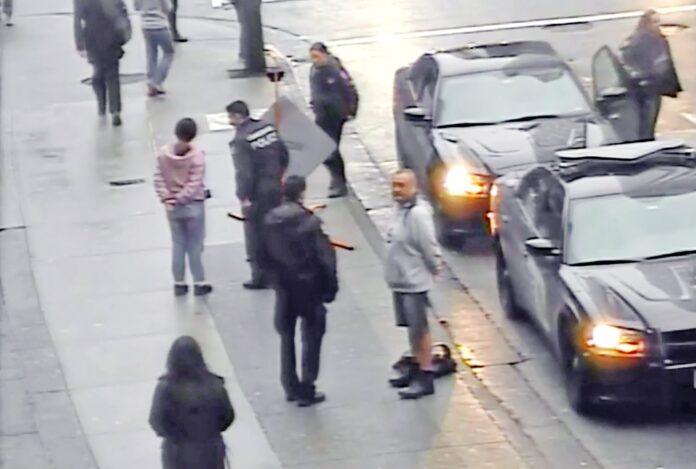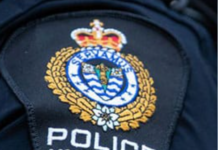HEILTSUK First Nation members Maxwell Johnson and his granddaughter have reached a ground-breaking agreement with the Vancouver Police Board to settle their BC Human Rights Tribunal complaints, ending a three-year fight for justice, and culminating in significant changes to fight systemic racism.
The settlement relates to events arising when Johnson and his granddaughter were detained and handcuffed by VPD constables after visiting a Bank of Montreal (BMO) in December 2019 to open a bank account. A bank employee had called 911 on suspicion that Johnson and his granddaughter had presented fraudulent Indigenous status cards. The handcuffing was witnessed by Johnson’s son.
Heiltsuk First Nation and the Union of British Columbia Indian Chiefs (UBCIC) worked hard to negotiate a unique and impactful settlement agreement that would not only recognize the breadth of the injury to Johnson and his granddaughter, but also to his son and the Heiltsuk community at large, who suffered from conduct reflecting Indigenous people’s vulnerability to discrimination by the police.
The settlement reflects an understanding that the discriminatory conduct was symptomatic of more systemic issues relating to how police view and treat Indigenous peoples, and includes measures aimed at identifying and addressing systemic policing issues.
The settlement agreement provides for the following remedies (a complete overview of the agreement is available here and at www.heiltusknation.ca):
* The police Board admits that the conduct discriminated against the complainants based on their Indigenous identities;
* Damages to the Johnson family for injury to dignity, the terms of which are confidential;
$100,000 to Heiltsuk First Nation’s restorative justice department to fund one-year of community programming for at-risk young women, including young women who suffer anxiety due to traumatic incidents;
* The police Board, Heiltsuk and UBCIC will review and develop plans over a two-year period for:
1. improving police training on anti-Indigenous racism, and cultural humility and competency, including interactions relating to Indigenous status cards, and
2. ensuring investigation protocols, risk identification protocols, and handcuffing procedures are non-discriminatory towards Indigenous peoples
* The police Board shall create an oversight committee, with members appointed by Heiltsuk and UBCIC, to oversee implementation of the settlement agreement;
* The police Board will publish an annual report on its website on the numbers and natures of complaints by or relating to treatment of Indigenous persons, and how they were addressed; and the BC Human Rights Commissioner will review and publicly report on systemic remedies initiatives under the settlement agreement;
* The police Board will create a position for an anti-Indigenous-racism officer, who will review complaints relating to Indigenous peoples and make recommendations to the Board, to ensure that procedures are non-discriminatory towards Indigenous peoples;
* $20,000 contribution to partially reimburse the Union of BC Indian Chiefs for expenses relating to its preparing expert evidence as an intervenor.
The police Board will be holding an apology ceremony at Heiltsuk’s Big House in Bella Bella on October 24. Johnson, a renowned Heiltsuk artist, will gift an artwork to the Board at the ceremony to signify reconciliation after the police Board formally apologizes. The ceremony will mark the start of the Board, Heiltsuk, and UBCIC working together on the initiatives under the settlement.
The Johnson family and Heiltsuk Nation’s fight against systemic racism includes the Strong as Cedar campaign (www.strongascedar.ca) which empowers Indigenous people and communities of colour to fight racism in Canada by sharing and gathering stories and highlighting solutions for change.
Johnson said: “Today’s settlement ends our legal action against the Vancouver Police Board. While my family is still in a healing process, we are committed to reconciliation and working with the police board to fight systemic racism, and make sure no one else has to experience what we went through. With today’s agreement, we can truly begin to heal and move forward.
Marilyn Slett, Chief Councillor, Heiltsuk Nation, said: “Today is an incredible victory against systemic racism. We all owe a debt of gratitude to Max and his granddaughter for their tireless pursuit of justice. As a nation, we will work hard with our partners to implement the many initiatives in this agreement, and make sure this kind of incident never happens again.”
Chief Don Tom (Kwul’thut’stun), UBCIC Vice-President, said: “The Union of British Columbia Indian Chiefs expresses our deepest gratitude and respect for the strength and determination of Maxwell Johnson Sr, Tori-Anne and family, as well as the Heiltsuk Tribal Council and Chief Slett. They stood up for the rights of our peoples and have been vindicated fully today. Discrimination and police mistreatment is traumatic, lasting, and the scars are physical and emotional. Historic settlements like the one announced today are welcome and long overdue. However, UBCIC knows once a settlement is reached, the work does not end, in fact begins and it will require serious commitment and accountability, especially if we hope to dismantle individual, systemic racism and structural discrimination. The commitments for change in this historic settlement present a path for reform and respect for the human rights of Indigenous peoples in Vancouver and the UBCIC will work with First Nations of the territory going forward. We hope this stands as an example for other police agencies and services across BC as they too have unfinished work.”
Vancouver Police Board said: “The Board recognizes the significance of the settlement we have reached with Mr. Maxwell Johnson and his granddaughter. We are looking forward to this opportunity to work in partnership with the groups involved by reviewing and improving a range of culturally sensitive and relevant practices and policies, in particular those focused on Indigenous people. We are committed to taking positive and collaborative steps forward to strengthen the Board and VPD’s Indigenous relations and to meet the terms of the settlement agreement in a way that honours the principles of Truth and Reconciliation, while building trust and confidence in the VPD and the Board’s oversight role of the VPD. It is our sincere goal to create a more meaningful relationship with Indigenous communities, and we believe the terms of this settlement will go a long way in furthering this goal.”












